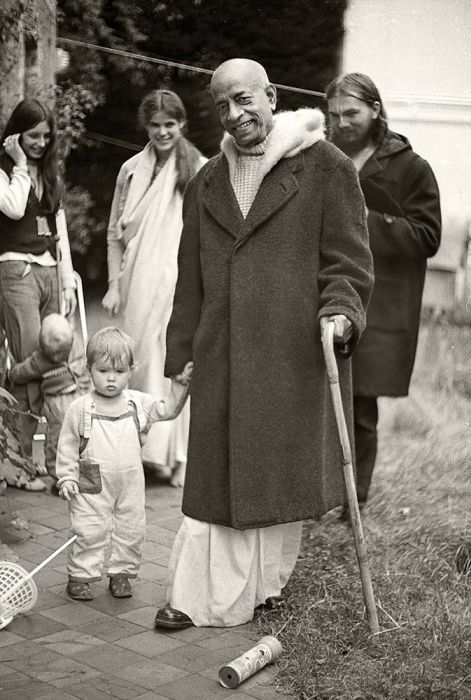Your Ever Well-Wisher: Stories of Srila Prabhupada’s Care for All
By Madhava Smullen | May 22, 2021
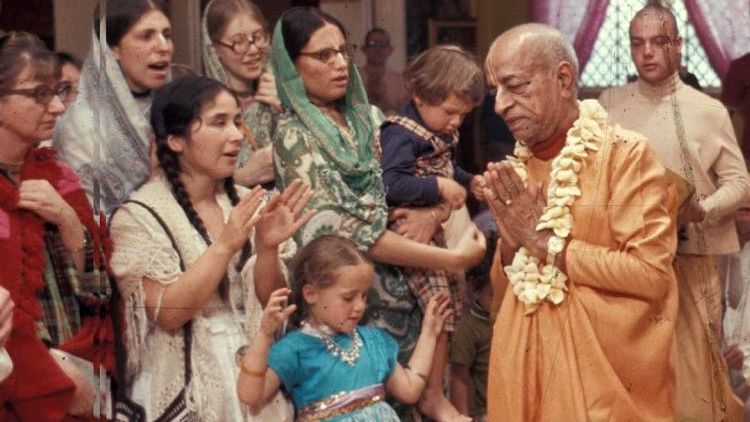
This year, we celebrate the 125th anniversary of the appearance of His Divine Grace A. C. Bhaktivedanta Swami Prabhupada, Founder-Acharya of ISKCON, born in 1896 in Calcutta. Leading up to his Appearance Day or Vyasa-Puja on August 31st, ISKCON News is commemorating the occasion with a series of articles glorifying his achievements, contributions and qualities.
A Mission of Care
One of Srila Prabhupada’s prominent qualities, embodied in his entire mission, was care for all living beings. Out of a desire to alleviate humanity’s suffering and introduce “India’s message of peace and goodwill” to the Western world, he left his home in the sacred village of Vrindavana on a cargo steamship in 1965 at the age of sixty-nine, enduring stormy seas and two heart-attacks along the way.
Carrying only forty rupees and a trunk of his Bhagavatam commentaries, the early days as he worked to establish ISKCON were in extremely adverse conditions. In New York City, he lived in a windowless room with no kitchen, and had to walk to the home of his only contact, Dr. Ramamurti Mishra, to cook during the frigid winter months. His typewriter and reel-to-reel tape recorder were stolen; and later, while he lived in the Bowery, he was threatened by a young man in an LSD-induced rage. But he persisted in his mission to give people the spiritual knowledge he knew could rescue them from the struggle of material existence, until followers like Mukunda Goswami (Michael Grant) joined him, and he incorporated ISKCON in July 1966.
Caring for Devotees’ Spiritual Wellbeing
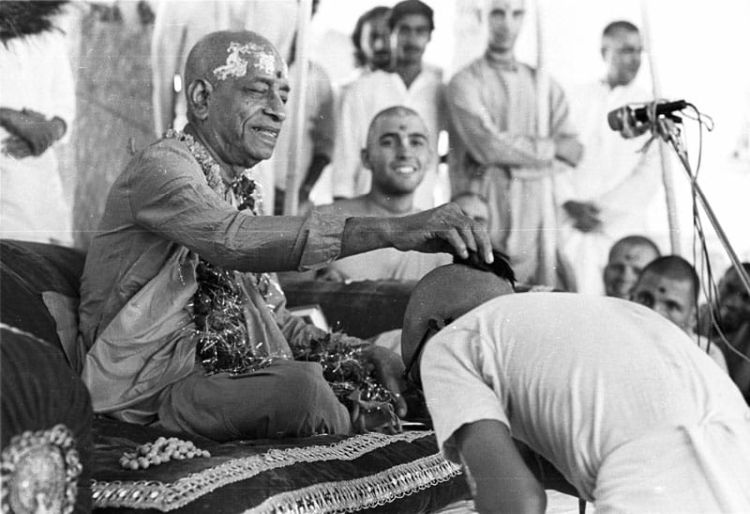
A playful, affectionate exchange between Srila Prabhupada and a newly initiated disciple
“In the Nectar of Devotion, Chapter 21, the Qualities of Sri Krishna are listed, and Srila Prabhupada writes, ‘As parts and parcels of the Supreme Lord, the individual living entities can also possess all of these qualities in minute quantities, provided they become pure devotees of the Lord,’” quotes Sangita Devi Dasi, Srila Prabhupada disciple and president and co-founder of Vaishnavas CARE. “Among others, three of the qualities of Lord Krishna that Srila Prabhupada exhibited so much were that he was 1) a well-wisher of the devotees, 2) merciful, and 3) kind-hearted.”
Sangita recalls her personal experience of these qualities. One occasion, showing Prabhupada’s care and how much he knew the mind of his disciples, occurred in 1972, when she had just come to Krishna consciousness, and was told by devotees that she could not live in her own place – she had to live in the temple to be a devotee. Writing to Srila Prabhupada, she asked him two questions: “How can I serve you?” and “Is it true that I have to live in the temple?” However she held back on a third question that concerned her, about the difficulty of following so many rules and regulations.
Srila Prabhupada sent back a letter dated September 29th, 1972, that Sangita felt was “very personal, and very sweet,” saying: “Actually there is no difference between devotees living inside the temple and devotees living outside the temple. You are right that the important thing is to remember Krsna, whatever is your activity.” He then directed her in how to remember Krishna through various devotional practices.
Incredibly, considering she hadn’t included her third question, he also wrote, “You are anxious about the rules and regulations, but without rules and regulations there is more frustration. So it may be a little difficult at first, but if you are sincere to achieve the highest result of your lifetime, then you can be assured that by your efforts in Krsna Consciousness that you will very quickly become happy more and more. The difficulties of this material world will shrink to no more than the size of a hoofprint left by the calf.”
Caring for Devotees’ Phsyical Health
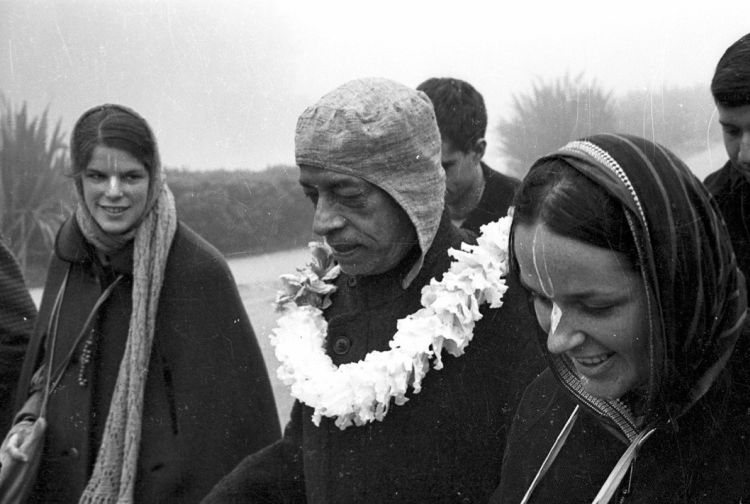
Srila Prabhupada with Malati Devi Dasi (left) and Yamuna Devi Dasi (right)
As well as caring for their spiritual health, Prabhupada also cared for his disciple’s physical health. When Sangita had a blood clot which became a pulmonary embolism, and wrote to Srila Prabhupada, he dictated a letter to his Sanskrit editor at the time, Nitai Das, which gave step-by-step directions on how to make a poultice from the sap of a particular tree and apply it to the clot.
“For him to take the time to dictate this to Nitai Das, and have him send it to me, was just the kindest thing anybody had ever done for me,” Sangita says. “And I just felt so loved and cared about.”
Meanwhile in the book Yamuna Devi: A Life of Unalloyed Devotion, the late Yamuna Devi recalls the time in 1971 after the first famous Delhi pandal program when she fell sick with jaundice while staying in a crowded room with many devotees. The one place free where she could stay on her own was the floor of a walk-in closet.
“Srila Prabhupada noticed I was missing,” she says, “And I was later told that he had inquired many times where I was. One day I became aware of the door being opened, and I turned to see Srila Prabhupada’s lotus feet walking into that closet room. . . . He placed his hand on my head and inquired, ‘Yamuna? How are you doing?’ Firstly I said, ‘I am always thinking of you, Srila Prabhupada.’ Then I explained my symptoms, and he said, ‘I think this is jaundice . . . Now I will take charge of your recovery. You will never get well in these conditions on the floor.’
“Srila Prabhupada had a hospital bed brought in for me and moved me into a room right next to his, with floor-to-ceiling windows, neem trees outside, and a fan. And I remember being propped up in this bed, and he came in every day to check on my progress.”
In a 2020 interview with the ISKCON Strategic Planning Office, Giriraja Swami remembers his own experience in Mumbai in the 1970s. “We were in Juhu, and I used to go to the city all day long and come back at night and report to Srila Prabhupada,” he says. “One evening after a long day in the city, having, as usual, traveled there and back in the crowded trains and to and from the train station in a crowded bus and not having had anything to eat since morning, I staggered up to Prabhupada’s room, exhausted. Prabhupada looked at me and asked, ‘How are you feeling?’ Only then did I notice how weak and sick I was. ‘Well, frankly speaking, Srila Prabhupada,’ I replied, ‘I feel a little tired.’
“He already knew, and he immediately ordered grapes for me. He said that they were good for strength and energy. Then he insisted that I eat the grapes in his presence, and after a minute or two he asked if I was feeling stronger. And yes, I was. “To work very hard for Krishna for two days,” he concluded, “And then to recuperate for three days — that is not a very good proposal.”
Caring for His Disciples’ Comfort, Welfare and Safety
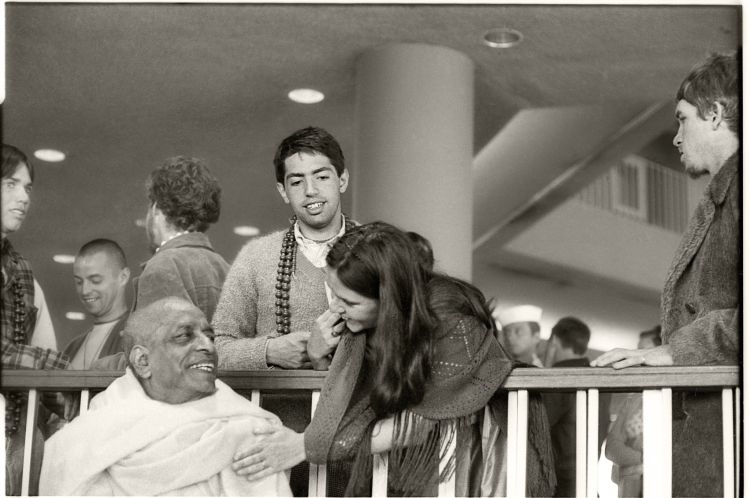
Srila Prabhupada with Mukunda and Janaki
Srila Prabhupada was also always tuned into the comfort, welfare and safety of his disciples, making sure they had their needs met.
“A couple of times he stopped his own vyasa-puja to inquire about the health and welfare of particular devotees whom he noticed,” says Malati Devi Dasi, a GBC member and one of Srila Prabhupada’s earliest disciples. “In one case, he asked a devotee who hadn’t been there for some time what happened, and the devotee explained he wasn’t well. Prabhupada said, ‘Are you getting what you need? Are you being taken care of? If you need anything, ask me.’”
Another disciple, Gopalasapriya Devi Dasi, recalls a July 1974 visit to New Vrindaban she’ll never forget. As Srila Prabhupada was talking to a group of devotees outside on a chilly evening. he stopped, looked at her and asked, “Are you alright? Such a thin cloth. Haven’t you got a cloth?” He then told one of the leaders, “You must find out if they have everything they need… the women need to be protected. They will not ask. You must ask them once a month and make sure that they are having everything they need.”
“I remember afterwards a few of the devotees were crying and feeling like he was so observant and concerned and he really does care about all of us,” she says.
Meanwhile in the book A Bond of Love: Srila Prabhupada and His Daughters, Sudamani Devi Dasi reminisces: “I was on the Vrindavana Parikrama when the women’s bus got caught in the sand in Varshana. It got later and later, and there was this huge argument between our bus driver and another bus driver. Our bus driver was afraid he wouldn’t get paid if we went on the other bus. So we took shelter at a nearby Durga temple, waiting until we were found. We were stranded and didn’t get back to the temple until close to midnight, where we found out Srila Prabhupada was in great anxiety. He had hired many taxis to go looking for us. He yelled at the leaders, ‘Why did you send the ladies off by themselves with no one to protect them?’ He said the men hadn’t taken proper care of his daughters.”
Srila Prabhupada’s Kindness to Children
Srila Prabhupada with two-year-old Saraswati (Malati in background) – Photo by Gurudas. Copyright The Bhaktivedanta Book Trust International, Inc
Malati Devi Dasi remembers that Srila Prabhupada was also always “so incredibly kind to the children.”
In 1969, when her daughter Saraswati was a little over two years old, Malati and other pioneers of ISKCON in the UK were staying at John Lennon’s Tittenhurst Park estate in a former horse stables that had been converted into small apartments. While cooking breakfast for the devotees, Malati would open the top half of the stable doors, while the bottom remained closed, so that she could see and hear Srila Prabhupada as he walked past on his morning walk.
“One morning, little Saraswati was jumping up and down, trying to see over the top of the door,” she recalls. “Somehow, she must have grabbed onto the handle in such a way that the door opened, and she ran out just when Prabhupada was going by, and grabbed his hand.”
It was a cold morning, and Srila Prabhupada wore a heavy wool coat and rubber boots. Concerned about Saraswati, who didn’t have a jacket or boots on, he said, “Saraswati, you’re not properly dressed.”
“She wouldn’t let go of his hand, so I brought her boots and coat,” Malati says. “I was trying to put them on her, but she would only extend one arm, while holding on to Prabhupada’s hand with the other. And when the coat sleeve was on one arm, then she would grab his hand and let go with the other so I could put the coat on the other arm. She was determined not to let go of him. Then off she went with him on the morning walk, holding his hand.”
Caring for Animals
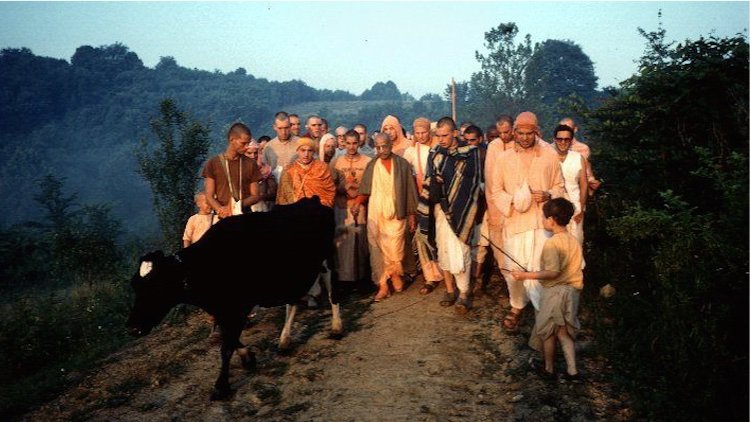
Srila Prabhupada and Kaliya the cow
Prabhupada also exhibited care for animals. During his first visit to New Vrindaban in May 1969, Prabhupada was introduced to the community’s first cow, a black jersey with a white mark on her forehead where Vaishnavas wear their tilak. Prabhupada himself named her Kaliya, and drank her fresh milk with delight, saying, “I haven’t tasted milk like this in fifty years.”
Over the next seven years, Prabhupada taught the devotees at New Vrindaban to maintain cows and bulls comfortably throughout their natural lives, respecting and caring for them as their proverbial mothers and fathers.
During his last visit to the community, in 1976, Prabhupada was walking with a large group of devotees to visit the farmhouse temple at the old Vrindaban farm, where Kaliya resided. Pointing to a small herd of cows far up at the top of a hill, Advaitacharya Das said, “Srila Prabhupada, look! There’s Kaliya. She’s our first cow. You used to drink her milk.”
Suddenly, as Prabhupada looked up at her, Kaliya, now the fourteen-year-old retired matriarch of New Vrindaban’s herd, broke away from the herd and made her way alone down the steep bank. Matching the devotees’ pace, she stepped out right in front of Srila Prabhupada, and began walking with him as if she were his pet calf. “Ah,” Srila Prabhupada said simply. “My dear old friend Kaliya.”
Caring for Plants
Srila Prabhupada even showed care for plants. Giriraja Swami recalls that in order to get permission to build the Juhu temple in Mumbai, the local municipality required the devotees to have an internal access road of a certain width, among other conditions.
“It just so happened that right where the access road was supposed to go, there were some palm trees,” says Giriraja Swami. “Once, when Srila Prabhupada came to Juhu after being away for some time, he noticed that one or two of the trees had been cut, and he was very concerned — I would say upset — and he asked, ‘Why did you cut down the trees?’ We thought we had the perfect answer: We had to build the temple, and to get the permission for the temple, we had to cut the trees in the way of the road. Srila Prabhupada said, ‘No, you go to the municipality and tell them it’s against our religion to cut down trees.’ So we had no choice, and we did it… On Srila Prabhupada’s order, we held our ground with the municipality, and in the end they gave us the permission to keep the tree. And even today we can see that tree that Srila Prabhupada protected, still standing there with asphalt all around it.
“So I am thinking that if Srila Prabhupada has so much concern and care and even love, I would say, for a tree, then what to speak of us — how much care and love he must have for us.”
Following Srila Prabhupada’s Example
Looking to the future of ISKCON, Rukmini Devi Dasi, a disciple of Srila Prabhupada initiated in 1968, says, “I think we have to create a culture that really imbibes and follows the mood of Prabhupada’s care, Krishna’s care, for all living beings. And then people will be so overwhelmed by this culture of care, these beautiful, shining, luminous people who care so much. The ISKCON society should be celebrated in the world as the most caring culture. Because that’s our philosophy, that the sacred spirit is there in every living being. So how do we act? How do we treat the environment? How do we treat other people? How do we treat people who look different from me, or act different from the way I act? It has to go from the book into the heart – otherwise, it’s just lip service.”
Malati Devi Dasi adds: “If we don’t care for each other, we can’t claim to care for or love Krishna. Because all living entities are His parts and parcels. So if we don’t care for His parts and parcels, in effect, we’re not caring for Krishna. And then how will we develop love for Him?”






